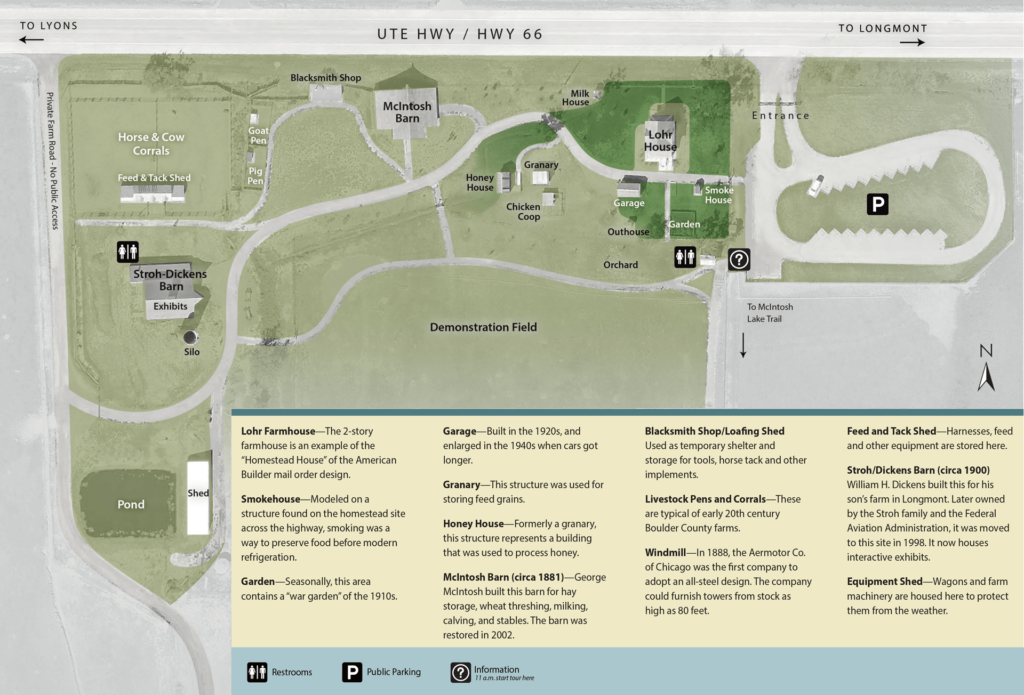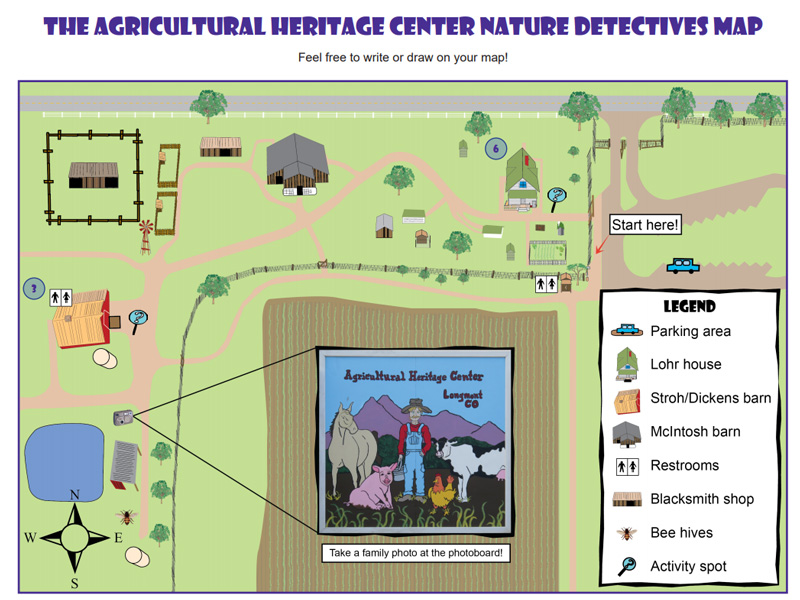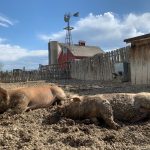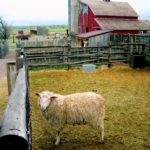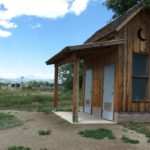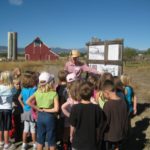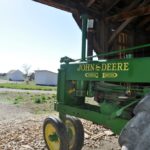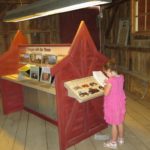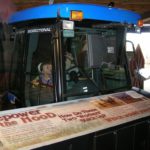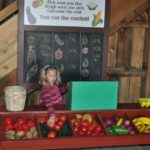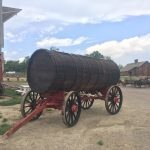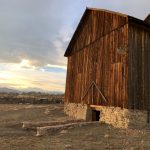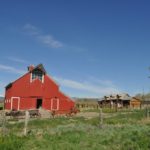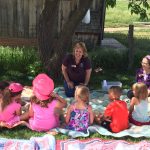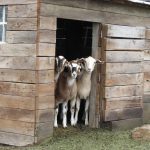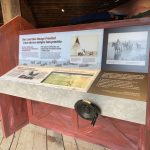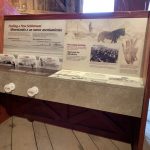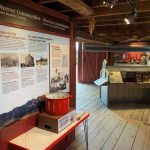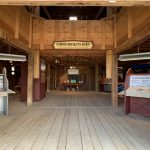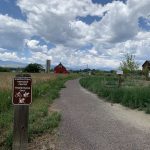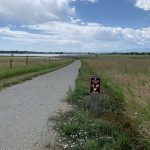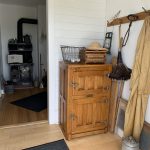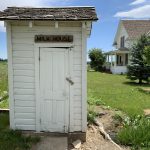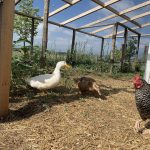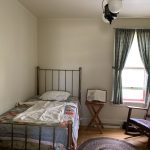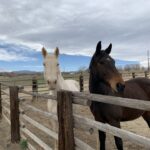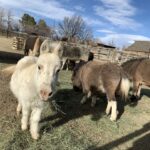Get a glimpse into the history of agriculture in Boulder County and enjoy the rural surroundings. This site focuses on the years 1900 to 1925 when local families prospered as farmers and witnessed the coming of the Modern Age.
Agricultural Heritage Center
Hours
Nov. 1 to March 31
The first Saturday of the month
10 a.m. – 5 p.m.
April 1 to Oct. 31
Friday: 10 a.m. – 5 p.m.
Saturday: 10 a.m. – 5 p.m.
Sunday: 10 a.m. – 5 p.m.
Admission and Tours
- Admission is FREE.
- Self-Guided Tour: Freely explore the grounds and buildings during visiting hours.
- Guided Tour: A guided tour starts at 11 a.m. during visiting hours (no registration required).
- Private Tour: Groups 8 or more can request a private tour year-round.
Getting There
8348 Ute Hwy
Longmont, CO 80503
Map and Directions
Note: parking and access to McIntosh Lake is allowed during visiting hours only.
Site Highlights
Step back in time and experience the charm of rural life at the Agricultural Heritage Center! Perfect for families, history buffs, and anyone looking for an interactive and memorable day, the center offers a hands-on journey into the past.
- Meet the Animals: Observe the friendly farm animals, including chickens, pigs, draft horses, and sheep, on-site from April through October.
- Interactive Exhibits: Dive into engaging displays and activities that bring the farming traditions of yesteryear to life.
- Historic 1909 Farmhouse: Tour a fully furnished farmhouse featuring authentic items from the 1900s and imagine what life was like over a century ago.
- Two Rustic Barns: Explore the beautifully preserved barns, each brimming with character and stories of hardworking farmers.
- Authentic Outhouse and Milk House: See the practical side of farm life with these restored relics of the past.
- Heirloom Garden: Stroll through the vibrant garden filled with heirloom plants and learn how early farmers cultivated the land.
- Live Blacksmith Demonstrations: Witness the artistry of traditional blacksmithing during special events held throughout the year. Check the calendar for scheduled demonstrations.
Whether you’re seeking a fun outing or a deeper appreciation for agricultural history, the Agricultural Heritage Center promises an unforgettable visit!
Nature Detectives Mystery Guide
Let your kids embark on their own adventure as Nature Detectives! With an activity-based guide, they’ll solve mysteries, collect clues, and engage in mindful exploration while uncovering the secrets of the natural world.
Mystery Guides are available on-site from Memorial Day through October, or print out your own.
Photos
Request a Private Tour
Educators and group leaders can request a tour for you students or groups at the Agricultural Heritage Center. It is a great way to learn about agriculture, Colorado history, food production, and life in the early 1900s.
You will enjoy getting outside and seeing firsthand how a farm operated, exploring the buildings and restored farmhouse, and seeing animals up close. Several interactive exhibits give you a chance to explore and learn independently.
- Tours are free.
- Request a tour for any day of the week (must be scheduled at least 21 days in advance).
- Minimum group size is 8 people.
- Average tour length is 1 to 1.5 hours and groups are allowed to stay for a maximum of 3 hours (for example, 10 a.m. – 1 p.m.).
- Bring picnic lunches to enjoy on the grounds.
- Tours are tied to curriculum guidelines.
- Bus funding available.
Frequently Asked Questions
A guided tour generally lasts 1 to 1.5 hours. A self-guided tour could take anywhere from 45 minutes to three hours depending on your schedule and interest.
Yes, there are picnic tables or you can bring a blanket to picnic on the grounds. Please dispose of all waste properly and respect the strict diets of our livestock by not feeding them.
No, pets are not allowed with the exception of service animals.
Yes, all buildings and trails are wheelchair accessible.
Yes, but only when the site is open (see hours).
No, we do not host weddings or other private events.
Yes, we are looking for volunteers. See information below for up-to-date information about recruitment.
Tour Guides
If you love history, sharing knowledge, and working with others, this volunteer opportunity is for you! Volunteer tour guides and farmhouse docents teach visitors about the agricultural history of Boulder County between 1900 and 1925. Learn More
Livestock Caretakers
Livestock are a vital component of the programs at the Agricultural Heritage Center. Help feed and take care of the animals. Cleaning pens is not required, but highly appreciated. Learn More
Gardeners
Volunteers are needed to manage the World War I era Victory Garden. This heirloom garden needs to be planned, planted, weeded, watered, and harvested. Learn More
Yes, but donations must have relevance to Boulder County, farming, mining, and/or life prior to 1940. We currently do not accept wrenches, scythes, sewing machines, stoves, jars, or bottles. If we cannot accept your item, we will suggest a suitable home for it, if possible. Please contact Jim Drew at jdrew@bouldercounty.gov for more information.
We do not allow visitors to feed the livestock. The animals are on loan to the Agricultural Heritage Center and follow a strict diet. Please check our volunteer opportunities as we periodically recruit livestock caretakers.
Yes, individuals engaging in still camera photography may use the Agricultural Heritage Center as long as your appointments occur during open hours (see hours). There is no fee.
All other commercial activities, such as filming movies or commercials, or photography for publishing or consumer goods, are not allowed.
No, we do not sell any farm products.
History
Like many Colorado pioneers in the mid-to-late 1800s, a young George McIntosh came to the Rocky Mountains to improve his health and wealth. He headed to the Pike’s Peak Region by wagon in the spring of 1860 during the height of the gold rush. Colorado’s semi-arid climate immediately helped his asthma.
George had many jobs along the Front Range including mining, serving in the Union army during the Civil War, farming and running freight. In 1868, George homesteaded the 160 acre parcel that is now the Agricultural Heritage Center. George married a young widow from Iowa named Amanda Jane (Lee) Noble. They ran a cattle operation and grew feed crops. By 1877, they had four children: Mark, Walter, George Jr., and Minnie.
George Lohr, an early Hygiene postmaster, purchased the original homestead parcel from George McIntosh after marrying George’s daughter, Minnie, in 1899. After the birth of their two sons, Neil R. ‘Shorty’ and Harry Galen, the Lohrs built the 1909 farmhouse on the site of the original log cabin. Like many farms of the time, they raised chickens, pigs and cows for subsistence and sold extras in town. They also raised vegetables and sugar beets which they sold to local canning and sugar companies.
Shorty Lohr never married and continued to live and work on the farm. He worked as a scenic tour bus driver at Rocky Mountain National Park and later took a position with the Boulder County Roads Department before retiring in 1974.
In 1985, Shorty sold the family farm to Boulder County. Upon his death, in 1991 at the age of 91, he donated $250,000 to establish an educational center on the property. The Agricultural Heritage Center opened to the public on May 12, 2001, George McIntosh’s 164th birthday.
Contact Us
Parks & Open Space
Jim Drew
jdrew@bouldercounty.gov
303-776-8688



